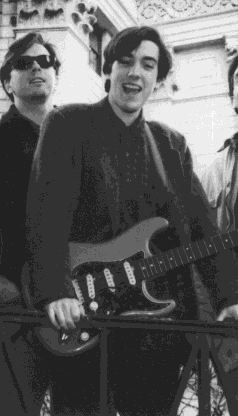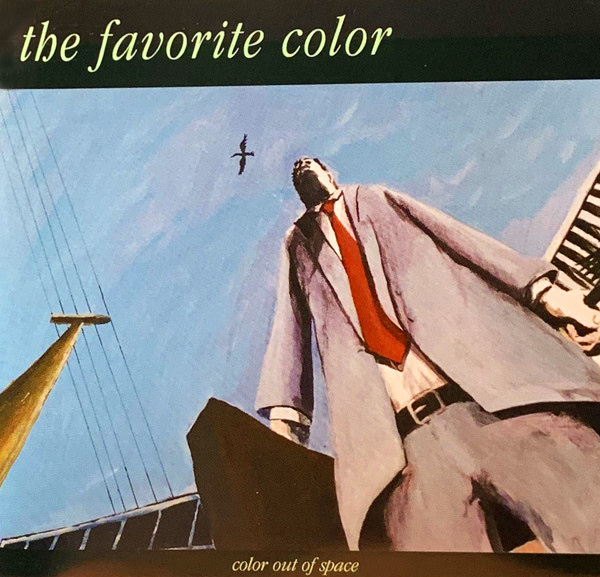Pynchon Music: The Favorite Color

LoV.e
The Favorite Color (1995–1996)
The Favorite Color was a short-lived New Jersey band fronted by novelist and rock journalist Tris McCall. They only released one LP, 1996’s Color Out of Space. Borrowing its name from an H.P. Lovecraft story, the album offers an inventive selection of 90s indie-pop, featuring a taut rhythm section, ringing guitars, and satisfying background harmonies. While Blur and R.E.M. are obvious influences, and one song name-checks Johnny Marr of the Smiths, the Favorite Color seems happy to chart their own course, with McCall’s nerdy lyrics investing songs like “Valis” and “Go Back to West New York” with a strangely affecting glee. (“Welcome to the food court / Now go back to West New York / We’d let you touch the merchandise / But you’re really not our sort.”) While everyone here plays tightly—Robyn Hitchcock’s Egyptians come to mind—the keyboards are what really makes the album shine. Playing everything from electric piano to harmonium, Steven Matrick unerringly brings the right amount color and texture to each track, from the swelling synths of “Mergers and Acquisitions” to the fusion-like excursions of “My Favorite Girls.”
Aside from a few forgettable songs (“Zero Charisma” is adequately named) the only downside to the album is the production. Color Out of Space has a weightlessness common to band-produced $10 CDs sold at gigs throughout the Nineties. It’s not bad—every instrument is clear in the mix—it’s just over-polished to a regrettable thinness. Still, a very promising debut from a band that never got the chance to really take off.
Pynchon Connection
There are several literary references in The Color Out of Space, from its Lovecraftian title to “Valis,” a song named after a Philip K. Dick novel. Another lyric alludes to Arthur C. Clark. But the song “V. In Love” wasn’t just inspired by Thomas Pynchon’s first novel, it’s a full setting of “The Eyes of a New York Woman,” one of the novel’s fictional songs. Claiming the song dates from the Great Depression, Benny Profane sings it to a young woman (identified as “jailbait”) in Chapter 6, “In which Profane returns to street level.” (Not Chapter 14, which is actually subtitled “V. in Love.”) The CD’s booklet refrains from reprinting the lyrics, the song marked only by “Please turn to Page 141,” that being the 1986 HarperPerennial paperback.
As Pynchon fans may know, this isn’t the first time the song has been set to music. The Insect Trust had their own version of “The Eyes of a New York Woman,” recorded in 1967 and quickly withdrawn after Pynchon threatened a lawsuit. Fortunately, they sought and received permission a few years later, re-recording the song for their excellent 1970 album, Hoboken Saturday Night. It’s likely that Tris McCall was aware of the song’s history, as his liner notes remark, “Lyrics taken from V. by Thomas Pynchon, who, with luck, will not take us to court.” One must also wonder—two New Jersey bands recorded this song? Perhaps an insight into trans-Hudson romance?
The song itself is possibly the most uncharacteristic on the album, sung plaintively over a shivering organ reminiscent of R.E.M.’s “Crush with Eyeliner.” (Which, come to think of it, may be describing the same subject!) Unlike Nancy Jeffries’ more wistful, bluesy version from Hoboken Saturday Night, McCall invests the lyrics with a note of defiance, repeating the final line three times: this Jersey boy ain’t gonna have his heart broken!
In December 2021, Allen Ruch of the Modern Word interviewed Tris McCall about Color Out of Space, “Eyes of a New York Woman,” and the influence of literature on his work.
Lyrics
“V. in Love”
Are the twilit side of the moon
Nobody knows what goes on back there
Where it’s always late afternoon
And far from the lights of home
With a smile just as sweet as a candy cane
And a heart all plated with chrome
And the boys with no place to go
All the drifter yeah he cried for an ugly
He left her in Buffalo
And dead as the graveyard sea
The eyes of a New York woman
Will never cry for me
They’ll never cry for me
They’re never going to cry
They’re never going to cry
For me
Additional Information
2. Valis (6:37)
3. V. In Love (2:23)
4. It’s too Late (5:00)
5. Go Back to West New York (5:34)
6. The Happier You Are (2:14)
7. Mergers and Acquisitions (5:29)
8. I Know What Happens Next (3:07 )
9. Zero Charisma (4:33)
10. Like Dissolves Like (3:29)
11. My Two Favorite Girls (6:20)
12. Perpetual Revolution (4.07)
Tris McCall—rhythm and tremolo guitars, lead and backing vocals.
D. Scribe—lead guitar, backing vocals, 12-string electric guitar (9).
Steven “Matrix” Matrick—electric piano, acoustic piano, analog synths, harmonium, cheesy organ, backing vocals.
Martin Severin—bass guitar, 6- and 12-string electric guitars.
Tom Snow—drums, tambourine, shaker, canasta, music stand, subway token.
The Everybody’s Hooked EP was Tris McCall’s first foray into serious recording. That said, he wasn’t responsible for much of it; he contributed two of the songs and all of the lyrics, but left arrangements and execution to other musicians. One of these others was D-Scribe, and this EP marks the first collaboration between the electric guitarist and Tris McCall. But the major musical figure shaping Everybody’s Hooked was synthesist Kenny Engels, now half of techno production team American Space Travellers. Kenny shared Tris’s attraction to analog synths, but unlike Tris, he could actually play them. He also favored soundscapes of the kind of synthetic density that was currently quite out of fashion, and much of Everybody’s Hooked sounds like a collision between Marillion and the Cowboy Junkies. With the sort of impeccably inappropriate timing that characterized everything about the Everybody’s Hooked project, the synth-laden, theatrical and complex EP was self-released at the exact time that grunge was taking America by storm. Sez Tris: “Nobody had any interest in a synth-prog-pop act, and to make matters worse, we had no clue how to promote ourselves. We were literally leaving copies of it on the street and running away.” Nevertheless, Tris considers this a quite decent little CD, and perhaps one whose time has come. He’s got a box of them in his place in union city, and he encourages old Genesis and Amon Düül fans to get in touch.
The Critics EP, on the other hand, is a pretty straightforward rock demo cassette—six songs by McCall and one by D-Scribe, performed with consummate Dylanesque verve. Recorded to secure interest and backing for the record that eventually became Color Out of Space, this demo cassette took on a life of its own. One of the more positive cats who used to spin it (can you spin a cassette?) was former Nyack and Blue Aeroplanes bassist Bill Stair, who introduced McCall’s music to sound engineer Tim Hatfield. Tim brought Tris and his group—now called the Favorite Color—to studio 900 on Broadway to cut two sides for a prospective single. Enthusiasm spilled over, and more than a year and several miles of analog tape later, Color Out of Space was completed.
The basic Favorite Color lineup featured Tris on lead vox and rhythm guitar, D-Scribe on lead and twelve-string guitar, Rumson New Jersey native and drummer Tom Snow (who had been collaborating with Tris, in one permutation or another, for more than six years) and bassist Martin Severin. Matrix added the Wurlitzer electric piano that, to Tris, sounded like coins dropping into a cash register, and tightly established the vibe of the project. Tris needed that sound so badly because he wanted to write about money: what it does to people, how it affects the ways they see things and how they live their lives, how material concerns box people in and define their relationships. So Snow tied a subway token to his hi-hat—to get that characteristic sizzle, and to remind everybody of the recent fare hike—and Tris, always polemical, stood a little taller on his soapbox for this one. The chosen métier was neopsychedelia, but Tom and Martin were Blur fans, and that’s inscribed pretty indelibly on Color Out of Space.
Pynchon on Record
Return to the main music page
Last Modified: 29 December 2021
Main Pynchon Page: Spermatikos Logos
Contact: quail(at)shipwrecklibrary(dot)com


